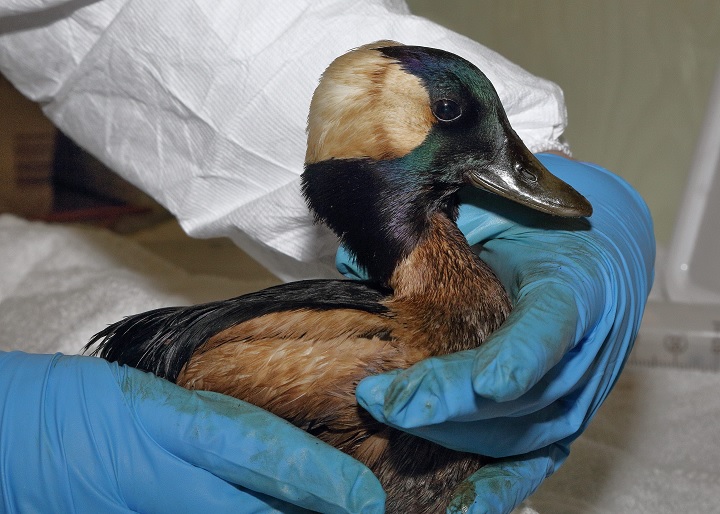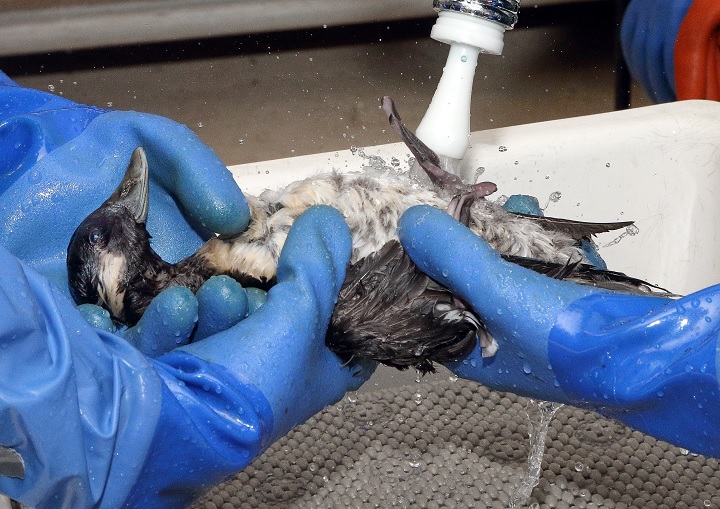On April 8, it will be one year since Vancouverites woke up to news of oil washing up on the shores of English Bay and the Stanley Park Seawall.

And still, no fines have been levied against the polluter and no costs have been recuperated for the emergency spill response.
English Bay oil spill 2015
The spill began on the evening of April 8, but it took a few days to confirm that Cypriot grain-carrying MV Marathassa was in fact the source of the fuel leak.
Transport Canada said the ship appeared to suffer a malfunction when it leaked about 2,700 litres of Bunker C fuel on its maiden voyage to Vancouver, launching a massive clean-up effort.
In the aftermath of the spill, it was made known that the operators of the MV Marathassa agreed to pay for the clean-up and the ship was allowed to leave Canadian waters.
Key Players and Costs
Transport Canada told Global News it could not outline the costs associated with the spill and it’s continuing its investigation into the MV Marathassa’s “fuel discharge” and the owners have been cooperating.
However they said they would not speculate on the amount of any fines or penalties but the “operators of the MV Marathassa have undertaken to pay for the clean-up and to appear in any future legal proceedings or prosecutions that could lead to potential fines being levied against them.”
Under the Marine Liability Act, the polluter is always responsible for paying the cost of an oil spill cleanup, including third party damages. This means that if a ship causes a spill, its owner is liable for losses and damages.
The maximum penalty provisions include a fine of $1 million or 18 months imprisonment.
The city of Vancouver said they did not pay for any share of the oil spill cleanup and that the Canadian Coast Guard is the lead agency for oil spills. In terms of other costs related to the oil spill response, the city said it will shortly be submitting the necessary documents for cost reimbursement from the responsible party.
According to a city spokesperson, they are currently working with the Canadian Coast Guard, First Nations, other local governments, and provincial and federal partners to develop a Burrard Inlet-specific Oil Spill Response Plan, which should be completed in 2016.
In the meantime, the city says it has already worked to improve a number of areas that include improving notification protocols and the sharing of situational awareness.
Both responses given by Transport Canada and the city of Vancouver are identical to the ones given in December 2015 to Global News, regarding a year-end follow-up story on the spill.
However the Canadian Coast Guard (CCG) was a little more forthcoming, saying the total cost of the oil spill response and recovery may never be known due to each participant in the MV Marathassa Unified Command, who may be making a claim, would be at a different stage and due to the confidentiality of negotiations.

Get weekly health news
Since the 2015 oil spill, the CCG says it has made “significant” progress. Along with plans to re-open and enhance Kitsilano as a Coast Guard Base with an expanded mandate for environmental and emergency response training for province’s coastal region, they have also completed several actions.
Those actions include: additional training in emergency and major spill response, notification procedures and systems improvements, and developing a Greater Vancouver Integrated Response Plan, which will outline how organizations work together to manage a spill.
What about the Wildlife rescue effort?
While various government agencies are shy about tallying the numbers, there’s one organization that knows what their efforts cost in relation to the oil spill. And ironically, they’re the one organization whose costs cannot be recovered by the polluter; instead the Wildlife Rescue Association of B.C. (WRA), a non-profit, has to take the $21,000 financial hit.
After being notified by the public about the spill, the WRA assembled their emergency response team and went to recover the wildlife impacted by the accident. They then fed, cleaned and medically treated numerous bufflehead ducks covered by fuel before eventually releasing them back into the wild.
READ MORE: Crews to continue spill clean-up in English Bay, residents advised to avoid beaches
Since the spill happened, WRA executive director Coleen Doucette says there has been no change in terms of wildlife regulations in B.C.
“It’s one of our biggest hurdles,” Doucette says.
“Since that time we’re still in the same position with a need to be proactive from our end because there are no laws in Canada or the province protecting wildlife when a spill occurs.”
Currently in Canada there is no legislation to ensure that wildlife is looked after during a spill response.
WATCH: Coleen Doucette from the BC Wildlife Rescue Association explains the environmental risks that remain.

That’s why partnerships with Dawn dish soap, which is owned by the American multinational consumer goods company Procter and Gamble, are so important, according to Doucette.
In addition to lobbying corporations for support, Doucette says the WRA has been working with the wildlife agencies both federally and provincially for more than 10 years to try to implement change and include wildlife in the response program.
But unfortunately they tend to fall victim to the lack of legislation in Canada both coastally and inland.
In this arena, Canada falls behind other countries like the United States, New Zealand and United Kingdom who all have regulations that include wildlife in spill response. Its one reason, Doucette says, WRA and other wildlife agencies in Canada have all the protocols in place for caring for animals.
“We look to all these other countries… that have programs in place and we take from all of that in the processes we use to care for the animals,” Doucette says.
“The funding for wildlife response falls to the public right now, whether it’s through the non-profit or the provincial government. And we are seeing a major increase as a wildlife organization in groups of animals being affected by human pollution over and above oil spills.”
In March, 62 seagulls were found trapped in a partially-covered scrap bin behind a tofu factory in east Vancouver and the birds had to get a full oil spill bath from workers at WRA.
While dangerous goods spills in B.C. water are not wholly uncommon, there were on average 2.6 spills every day in the province’s ocean in 2014.
According to statistics from Emergency Management B.C., there were 932 spills of dangerous goods into B.C. ocean waters in the 2014-15 fiscal year. This was the highest number in 15 years – the average over that time has been 845 per year.
READ MORE: Number of spills in B.C. waters increased in last 2 years
Ironically Doucette says the cost of wildlife response goes up when they are not prepared; which makes the preparedness planning process and integrating wildlife rescue as part of the response, so important.
With lobbying the federal and provincial governments for wildlife regulations falling short, Doucette says the WRA is looking to corporations to help.
“WRA is working very hard in positioning ourselves to be prepared for any of these incidences,” Doucette says.
“So we’re looking to corporations to step in, taking a role like Dawn has done, so we can build an emergency response unit to be on the front lines.”
For more information on the WRA or to get involved as a volunteer or be a part of their preparedness team, click here.
~ with files from Yuliya Talmazan and Leslie Young
- Donald Trump claims B.C.’s ‘very large faucet’ could help California’s water woes
- Canada must speed up progress to hit its 2030 emissions target: report
- U.S. TikTok ban case pits free speech vs. national security. Which will win?
- A final, tragic text from doomed Titan sub revealed at Coast Guard hearing


















Comments